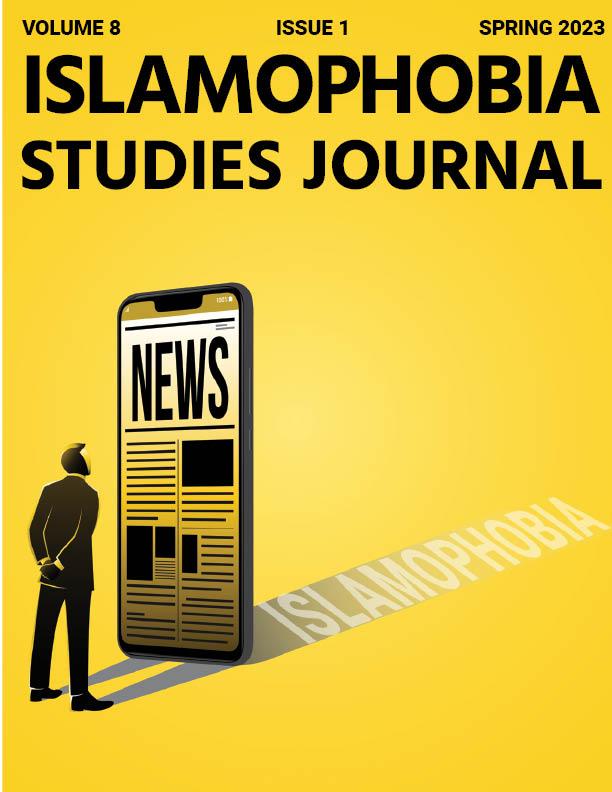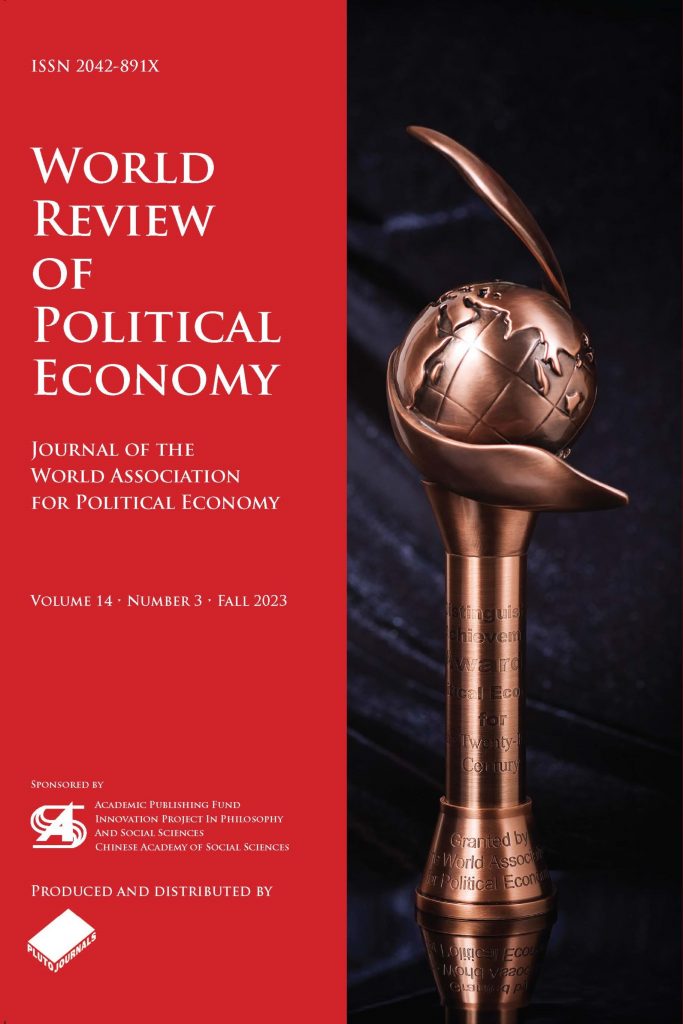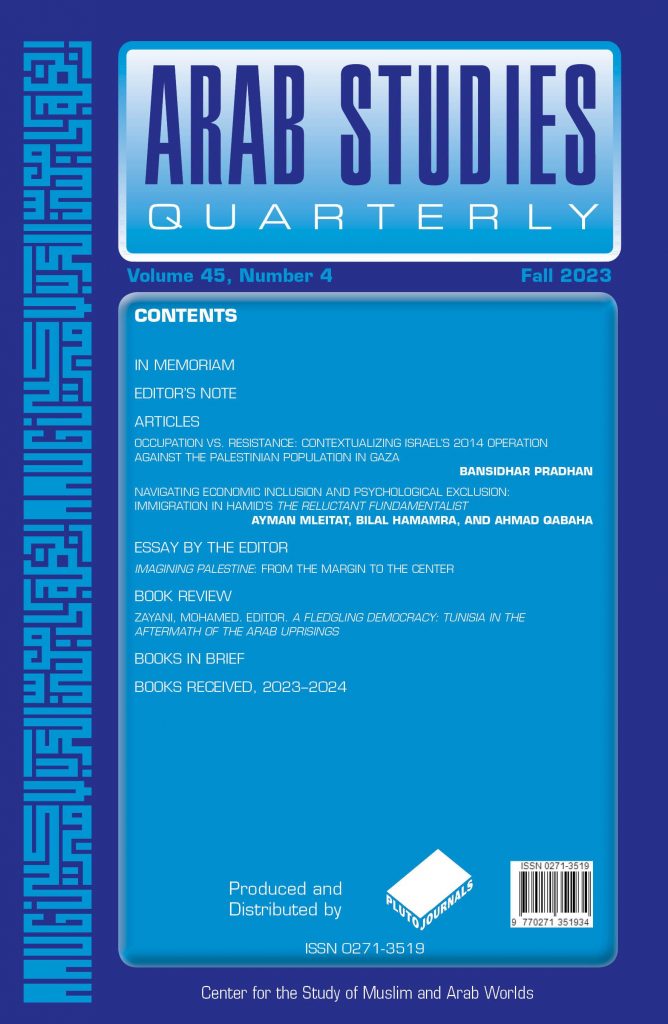Islamophobia, Poverty & Pandemic
 Islamophobia Studies Journal is produced in collaboration with the Islamophobia Research and Documentation Project at the Centre for Race and Gender at Berkeley: a research unit dedicated to the systematic study of Othering Islam and Muslims. In the latest issue, Volume 8 issue 1, Nofret Berenice Hernández Vilchis considers Fighting Islamophobia Through Preservation of Memory. A Case Study: Palestinian Journalism. In Effective Countering Islamophobia Strategies in the Digital Age: Three Approaches, Sahar Khamis explores three important strategies which have been successfully deployed by Muslims to resist Islamophobia in the digital age. In her paper Gendered Islamophobia in Italy: The Case of Silvia Aisha Romano, author Marta Panighel, applies a discourse analysis to examine the contemporary debate on Muslims and Islam in Italy and the media’s role in reproducing stereotypes and discrimination.
Islamophobia Studies Journal is produced in collaboration with the Islamophobia Research and Documentation Project at the Centre for Race and Gender at Berkeley: a research unit dedicated to the systematic study of Othering Islam and Muslims. In the latest issue, Volume 8 issue 1, Nofret Berenice Hernández Vilchis considers Fighting Islamophobia Through Preservation of Memory. A Case Study: Palestinian Journalism. In Effective Countering Islamophobia Strategies in the Digital Age: Three Approaches, Sahar Khamis explores three important strategies which have been successfully deployed by Muslims to resist Islamophobia in the digital age. In her paper Gendered Islamophobia in Italy: The Case of Silvia Aisha Romano, author Marta Panighel, applies a discourse analysis to examine the contemporary debate on Muslims and Islam in Italy and the media’s role in reproducing stereotypes and discrimination.
In Responding to Islamophobia: British Muslims “Talk Back” to the UK, Sabah Firoz Uddin analyses forms of British Muslim cultural production, including visual art, fashion, music, and poetry to explore how second and third generation Muslims in Britain resist calls to become “normal” or “good” Muslims. A. Coletsou studies the audiovisual representations of Iran by American popular culture from 1973 until today in Cinematic Representations of Iran after 9/11 and their Instrumentalization by the American Foreign Policy. In Mapping Islamophobia: The Indian Media Environment, M. Mohibul Haque and Abdullah Khan examine the Islamophobic media coverage in India, the deliberate and carefully designed dissemination of factually inaccurate narratives, signs of Islamophobia, and the government’s stance on this issue. Hisham Aidi looks at Moulay Ismail and the Mumbo Jumbo: Black Morocco Revisited, with critical reference to Chouki El Hamel’s Black Morocco: A History of Slavery, Race and Islam (2015). Sheheen Kattiparambil focuses on the relationship between nation-making and the emergence of Islamophobia in India in her article Conceptualizing Islamophobia in India. Premising on the idea that Islamophobia should be understood as the negation of Muslim political subjectivity, this article argues that Hindutva is not an aberration rather it is a continuation of the Indian nation-making project with the Muslim placed as the other of this project. Finally, Iskander Abbasi charts a genealogy of Russian Islamophobia from mediaeval Tsardom to modern Soviet and Post-Soviet Russia in Russian Islamophobia: From Medieval Tsardom to the Post-Soviet Man, arguing that they signify a cohesive and consistent form of longue durée Russian Islamophobia which shares much in common with other renditions of Islamophobia emanating from the West.
 In the latest issue of World Review of Political Economy, Volume 14 Issue 3, Persefoni Tsaliki and Lefteris Tsoulfidis’s article Financialization Historically Contemplated: Putting Old Wine in New Barrels examines the extent to which financialization is a new phase of capital accumulation characterised by its own economic laws in which the real (production) economy adjusts accordingly. B. Gloria Martínez and Alejandro Valle Baeza explore Capital Composition and Rate of Surplus Value: Empirical Evidence for Rethinking the Value Transfers in International Trade. Satoshi Ohira and Chen Li consider A Marxian Optimal Growth Model for Economies with Minimum Subsistence Wages. In The Debt-Austerity Crutch: African Elite Agency in the Fourth (US) Cycle of Accumulation of Historical Capitalism Salimah Valiani offers a systemic, class-based explanation for what is commonly understood as the anti-democratic nature of international financial institutions and corruption of African leaders. The analysis provides an explanation for why not a single African state has defaulted on external debt, as Argentina did, in 2001.
In the latest issue of World Review of Political Economy, Volume 14 Issue 3, Persefoni Tsaliki and Lefteris Tsoulfidis’s article Financialization Historically Contemplated: Putting Old Wine in New Barrels examines the extent to which financialization is a new phase of capital accumulation characterised by its own economic laws in which the real (production) economy adjusts accordingly. B. Gloria Martínez and Alejandro Valle Baeza explore Capital Composition and Rate of Surplus Value: Empirical Evidence for Rethinking the Value Transfers in International Trade. Satoshi Ohira and Chen Li consider A Marxian Optimal Growth Model for Economies with Minimum Subsistence Wages. In The Debt-Austerity Crutch: African Elite Agency in the Fourth (US) Cycle of Accumulation of Historical Capitalism Salimah Valiani offers a systemic, class-based explanation for what is commonly understood as the anti-democratic nature of international financial institutions and corruption of African leaders. The analysis provides an explanation for why not a single African state has defaulted on external debt, as Argentina did, in 2001.
In China’s Long War on Poverty Carlos Martinez discusses the anti-poverty measures taken during the various phases of the Chinese Revolution, concluding that poverty alleviation, and the improvement of people’s living standards, has been foundational to the entire Chinese socialist project. Based on a class analysis, Anatolii Arseienko and Vitalina Butkaliuk’s article The Social Consequences of the Global Expansion of the COVID-19 Pandemic shows the failure of the commercialised health care system in the Global North and South to address the COVID-19 pandemic and concludes that global civilization must move toward a more just and democratic world order that is able to put the health of workers before monopoly profits, and to guarantee everyone the right to live with dignity.
 In the latest issue of Arab Studies Quarterly Volume 45 Issue 4, Bansidhar Pradhan argues that the 2014 operation, code named “Operation Protective Edge,” was but a part of Israel’s long-term, well-thought-out, and consistently pursued policy of crushing Palestinian resistance and eliminating Palestinian identity and nationalism in Occupation vs. Resistance: Contextualizing Israel’s 2014 Operation Against the Palestinian Population in Gaza. In Navigating Economic Inclusion and Psychological Exclusion: Immigration in Hamid’s The Reluctant Fundamentalist, Ayman Mleitat, Bilal Hamamra, and Ahmad Qabaha offer a comprehensive analysis of Changez’s struggle for acceptance in America by placing his experiences as an immigrant within the broader political and socio-economic global system. There is also a timely essay by the editor, Ibrahim G. Aoudé, titled Imagining Palestine: From the Margin to the Center which concludes that the culture of resistance in concert with the armed struggle will empower the marginalised in realising this objective. Tahrir Hamdi’s Imagining Palestine reaffirms this thesis of liberation.
In the latest issue of Arab Studies Quarterly Volume 45 Issue 4, Bansidhar Pradhan argues that the 2014 operation, code named “Operation Protective Edge,” was but a part of Israel’s long-term, well-thought-out, and consistently pursued policy of crushing Palestinian resistance and eliminating Palestinian identity and nationalism in Occupation vs. Resistance: Contextualizing Israel’s 2014 Operation Against the Palestinian Population in Gaza. In Navigating Economic Inclusion and Psychological Exclusion: Immigration in Hamid’s The Reluctant Fundamentalist, Ayman Mleitat, Bilal Hamamra, and Ahmad Qabaha offer a comprehensive analysis of Changez’s struggle for acceptance in America by placing his experiences as an immigrant within the broader political and socio-economic global system. There is also a timely essay by the editor, Ibrahim G. Aoudé, titled Imagining Palestine: From the Margin to the Center which concludes that the culture of resistance in concert with the armed struggle will empower the marginalised in realising this objective. Tahrir Hamdi’s Imagining Palestine reaffirms this thesis of liberation.
Stay up-to-date with the latest research highlights by signing up to the Pluto Journals newsletter!

